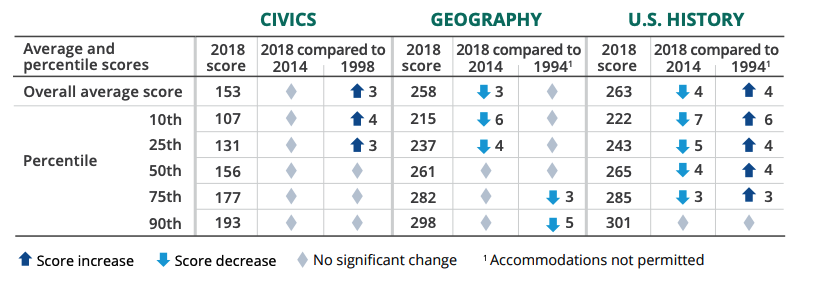Education Secretary Betsy DeVos has called the results of a national assessment on eighth-grade academic performance “inexcusable.”
The secretary of Education responded to the release of 2018’s civics, geography, and U.S. history assessments taken by a representative sample of U.S. eighth-graders at public and private schools across the United States on Thursday, saying the country needs to “fundamentally rethink education in America.”
“America’s antiquated approach to education is creating a generation of future leaders who will not have a foundational understanding of what makes this country exceptional. We cannot continue to excuse this problem away,” she said in a press release.
“Instead, we need to fundamentally rethink education in America. It is the only way our nation’s students will be in a position to lead our nation and the world,” she said.
Scores in U.S. history were down an average of 4 points compared to 2014 levels but were still up 4 points compared to an assessment in 1994, according to the National Assessment of Educational Progress report.
Scores decreased 5 points for black and white students, 4 points for Hispanic students.

Less than a quarter of eighth-graders are performing at or above the NAEP proficiency level in any social science assessment. In 2014, 18% of students were deemed proficient in U.S. history. The proportion has dropped in the 2018 exam results, and only 15% of eighth-graders are proficient or above proficient in U.S. history.

DeVos lamented the results, saying, “The results are stark and inexcusable. A quarter or more of America’s eighth graders are what NAEP defines as ‘below basic’ in U.S. history, civics and geography. In the real world, this means students don’t know what the Lincoln-Douglas debates were about, nor can they discuss the significance of the Bill of Rights, or point out basic locations on a map. And only 15% of them have a reasonable knowledge of U.S. history. All Americans should take a moment to think about the concerning implications for the future of our country.”
The NAEP is a continuous evaluation of “the condition of education in the United States.” The NAEP assesses the proficiency of U.S. students across 10 subjects in fourth, eighth, and 12th grades.

